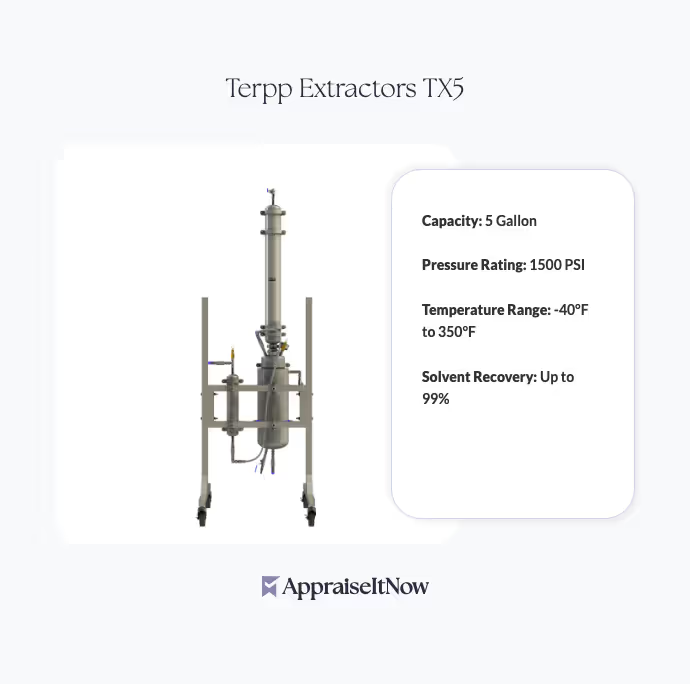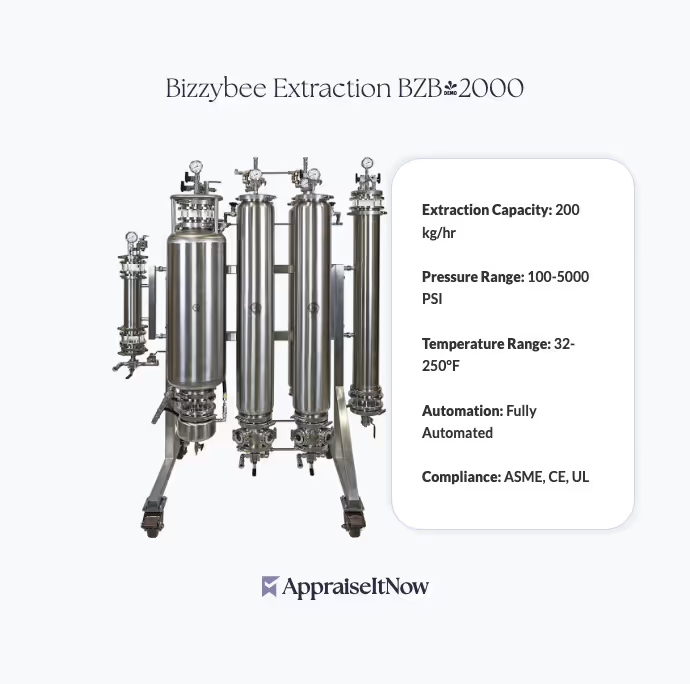<h1>How to Get Your Isolation Extraction System IE-5 Appraised</h1>
<p>The Isolation Extraction System IE-5 is a highly specialized piece of industrial equipment valued between <strong>$270,000 and $300,000</strong> in today's market. Whether you're considering a sale, need insurance documentation, or are evaluating the system for financing purposes, obtaining a professional appraisal is essential to understanding your asset's true worth.</p>
<h2>What You're Valuing: The IE-5's Technical Excellence</h2>
<p>The Isolation Extraction System IE-5 represents cutting-edge technology designed to efficiently isolate and extract specific compounds from complex mixtures. Since its introduction in 2010, the IE-5 has become trusted by leading research laboratories for its ability to deliver consistent, high-purity extracts while maintaining the integrity of even the most delicate and sensitive substances.</p>
<p>Your IE-5 likely features advanced filtration, separation, and purification technologies that set it apart from standard equipment. The system's robust construction, precise controls, and automated features make it valuable across multiple applications—from pharmaceutical research and development to environmental remediation and cannabis isolate production. Understanding these capabilities helps you appreciate why professional appraisers require specialized knowledge in <a href="/blog/a-guide-to-understanding-the-value-of-laboratory-equipment">lab equipment valuation</a>.</p>
<h2>Key Factors That Influence IE-5 Valuation</h2>
<p>When appraising your Isolation Extraction System IE-5, several specific factors directly impact its market value. The system's <strong>cGMP compliance certification</strong>, for instance, significantly affects its worth in pharmaceutical and regulated industries. Similarly, its <strong>capability for isolating nanomaterials</strong> and energy-efficient design represent features that appraisers must understand to properly value your equipment.</p>
<p>Age matters considerably—a system purchased in 2018 will appraise differently than one from 2022. However, the IE-5's minimal maintenance requirements and 5-year warranty coverage (if still valid) can offset some depreciation concerns. Hours of operation and maintenance history are equally critical, as a well-documented system with regular service records commands premium value over equipment with uncertain operational history.</p>
<div class="callout tip"><p><strong>Valuation Factor</strong></p>
<p>Documentation of proper maintenance, calibration records, and service invoices can increase your IE-5's appraised value by 10-15% compared to systems with incomplete records.</p></div>
<h2>Regulatory Compliance and Market Impact</h2>
<p>Cannabis extraction systems face unique valuation challenges related to regulatory and licensing issues. If your IE-5 operates in a state cannabis market, state licensing compliance, local regulations, and potential changes in cannabis laws directly affect both current value and future marketability. An appraiser evaluating your system must understand these regulatory landscapes to provide accurate valuations.</p>
<p>The IE-5's <strong>cGMP certification</strong> also matters beyond just cannabis applications. This compliance badge makes the system suitable for pharmaceutical, botanical, and supplement manufacturing contexts. This regulatory flexibility increases your system's market appeal and justifies higher valuation compared to equipment locked into single-use applications. Professional appraisers with experience in <a href="/blog/7-steps-to-obtain-an-accurate-chemical-equipment-appraisal">chemical equipment</a> understand these compliance nuances.</p>
<div class="callout note"><p><strong>Regulatory Insight</strong></p>
<p>Equipment with multiple regulatory certifications (cGMP, ISO standards) has broader market appeal and typically appraises 15-20% higher than single-certification systems.</p></div>
<h2>Comparable Sales and Market Data</h2>
<p>One challenge in appraising specialized extraction equipment is sourcing reliable comparable sales data. Unlike mass-produced equipment, comparable sales for used IE-5 systems are scattered across auction results, dealer sales, and private transactions. Professional appraisers access industry databases, attend equipment auctions, and maintain networks within the extraction equipment community to establish market benchmarks.</p>
<p>When seeking comparable sales data for your appraisal, consider that cannabis extraction equipment specifically shows different market dynamics than general industrial equipment. Auctions focused on cannabis industry assets, private dealer networks specializing in extraction systems, and direct industry publications provide the most reliable comps. Your appraiser should be able to cite specific comparable sales from the past 12-24 months to support your IE-5's valuation.</p>
<h2>Depreciation and Useful Life Expectations</h2>
<p>Industrial extraction systems typically depreciate according to predictable schedules. Your IE-5, despite its sophisticated design, likely follows standard depreciation models for specialized equipment. Most extraction systems show significant depreciation in the first three years of operation, then slower depreciation as they establish track records and prove reliability.</p>
<p>For the IE-5 specifically, useful life estimates generally range from 10-15 years with proper maintenance. This means a well-maintained five-year-old system still has substantial remaining value, while a ten-year-old unit with heavy use may require more significant depreciation adjustments. Professional appraisers factor in the system's specific condition, maintenance history, and technological advancement pace to develop appropriate depreciation calculations for your asset.</p>
<h2>Modifications and Upgrades</h2>
<p>Has your IE-5 been modified with additional components or manufacturer upgrades? These modifications significantly impact valuation. Some upgrades—like enhanced control systems or additional purification stages—increase value by improving functionality or output quality. Other modifications, particularly non-certified or improper installations, can actually decrease value by creating regulatory compliance concerns.</p>
<p>Professional appraisers qualified in <a href="/types/equipment-and-machinery">equipment and machinery valuation</a> must examine any modifications carefully, verifying that upgrades maintain manufacturer specifications and don't void warranties. Documentation showing that modifications were performed by authorized service providers or the manufacturer themselves supports higher valuations. Custom modifications by unverified technicians require appraisers to apply conservative adjustments that may significantly reduce your system's appraised value.</p>
<h2>Essential Documentation for Your Appraisal</h2>
<p>The strength of any equipment appraisal depends heavily on documentation quality. For your IE-5, compile these critical materials before contacting an appraiser:</p>
<p>Your <strong>purchase invoices and original equipment documentation</strong> establish the system's specifications and baseline value. <strong>Service records and maintenance logs</strong> demonstrate proper care and help justify premium valuations for well-maintained equipment. <strong>Calibration certificates and compliance documentation</strong> prove the system meets regulatory standards essential for its market value. <strong>Serial numbers, parts lists, and technical manuals</strong> allow appraisers to verify authenticity and condition.</p>
<p>Additionally, <strong>photographs from multiple angles</strong> showing the system's overall condition, control interfaces, and any wear patterns provide visual documentation. If your IE-5 has been used in production, <strong>manufacturing records showing output or performance metrics</strong> help appraisers understand the system's actual operational history rather than relying on estimates.</p>
<div class="callout tip"><p><strong>Documentation Priority</strong></p>
<p>Systems with complete service records and calibration certificates typically appraise 15-20% higher than equipment with spotty or missing documentation history.</p></div>
<h2>The Appraisal Purpose Matters</h2>
<p>Your IE-5's appraised value can vary based on why you're seeking the appraisal. A <strong>sale appraisal</strong> reflects fair market value assuming an arm's-length transaction between willing buyer and seller. An <strong>insurance replacement appraisal</strong> might be higher, reflecting what you'd pay to replace the equipment with equivalent new systems. A <strong>financing collateral appraisal</strong> for a loan typically uses conservative valuations. An <strong>estate settlement appraisal</strong> may require specialized analysis of the system's actual market liquidity and buyer pool.</p>
<p>Understanding your appraisal's intended use helps ensure your appraiser applies appropriate valuation methodologies. Professional services like <strong>AppraiseItNow</strong> can provide <a href="/blog/what-to-expect-from-a-laboratory-equipment-appraisal">USPAP-compliant appraisals</a> suitable for any of these purposes, ensuring your documentation meets legal and institutional requirements.</p>
<h2>Transportation and Installation Costs</h2>
<p>If you're considering selling your IE-5, buyers will want to understand transportation and re-commissioning costs. These expenses, typically ranging from $5,000 to $25,000 depending on destination and equipment setup requirements, affect your net proceeds. Smart appraisals note these costs separately from the equipment's market value, giving both buyer and seller clear understanding of total transaction expenses.</p>
<p>Professional appraisers with experience in <a href="/types/cannabis-equipment">cannabis equipment</a> valuation understand typical transportation logistics for specialized extraction systems. They can help you understand whether your appraisal should reflect "as-is, in-place" value or "ready to operate at destination" value, an important distinction that significantly affects total acquisition cost for potential buyers.</p>
<h2>Market Trends and Technological Change</h2>
<p>The extraction equipment market responds to several dynamic factors. Demand for isolate products continues growing across pharmaceutical, supplement, and cannabis industries, supporting healthy equipment demand. However, technological obsolescence poses a risk—newer systems may offer superior efficiency, regulatory compliance, or output quality that makes older generations less desirable.</p>
<p>Your IE-5's introduction in 2010 places it well ahead of truly obsolete equipment, yet newer models may have enhanced capabilities. Professional appraisers evaluate where your system sits on the technology lifecycle curve, assessing whether it offers competitive advantages or represents aging technology. This technological assessment directly influences valuation, making it essential that your appraiser understands current extraction system innovations and market preferences.</p>
<h2>Turnaround Time and Service Expectations</h2>
<p>When you're ready to pursue a professional appraisal, expect that specialized equipment like extraction systems require longer evaluation periods than standard assets. Most qualified appraisers need <strong>3-5 business days minimum</strong> after receiving complete documentation and photographs to develop thorough, defensible valuations. If the appraiser needs to physically inspect your system or consult with specialists, add another week to your timeline.</p>
<p>Fee ranges for USPAP-compliant extraction system appraisals typically start at <strong>$1,500 to $3,000</strong> depending on complexity, location, and the appraiser's expertise level. More comprehensive valuations requiring extensive market research or comparative analysis may cost $3,000-$5,000. While this represents real investment, professional documentation protects far larger asset values and provides legally defensible support for your transaction, insurance claim, or financial decision.</p>
<h2>Choosing Your Appraiser Wisely</h2>
<p>Not all appraisers understand specialized equipment like your IE-5. Look for professionals with specific experience in <a href="/blog/7-steps-to-obtain-an-accurate-chemical-equipment-appraisal">chemical equipment appraisal</a>, cannabis industry equipment, or industrial pharmaceutical systems. Your appraiser should have verifiable credentials—look for <strong>AAA (American Association of Appraisers), ISA (International Society of Appraisers), ASA (American Society of Appraisers), CAGA (Cannabis Appraisers Guild of America), or AMEA (Association of Machinery and Equipment Appraisers)</strong> designations.</p>
<p>Ask potential appraisers about their specific experience with extraction systems. Have they appraised IE-5 models specifically? Do they understand regulatory compliance requirements for your system's intended market? Can they provide references from previous clients who valued similar equipment? These questions help ensure you select an appraiser genuinely qualified to properly evaluate your significant asset.</p>
<div class="callout note"><p><strong>Key Takeaway</strong></p>
<p>Your Isolation Extraction System IE-5, valued between $270,000 and $300,000, deserves professional appraisal services from credentialed experts who understand specialized extraction equipment. Complete documentation, clear understanding of your appraisal's purpose, and selection of an appraiser with specific industry experience ensure you receive accurate, defensible valuation that protects your interests whether buying, selling, insuring, or financing this valuable asset.</p></div>
















